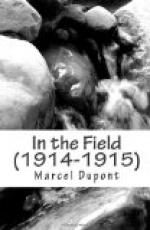One thing I specially remember: the sight of an officer’s cap, with a red band, hanging from one of the branches of the large chandelier in the centre of the room. And I could not help picturing to my mind the head of the man it had belonged to, some Rittmeister, with an eyeglass, fat pink cheeks and neck bulging over the collar of his tunic. What a pity he had been able to decamp! That is the kind of countenance we should so much have liked to see closer and face to face.
But I could not wait. We rushed hastily through drawing-rooms turned upside down, and bedrooms where the beds still bore traces of summary use by heavy bodies. But we found no forgotten drunkard in them.
My two corporals were already waiting for us when we returned to the courtyard. They had not found any one in their search. Quickly we mounted, and passed rapidly out by the gilded gates. The old servant and the gardener were still on the same spot, standing silent and depressed. They said not a word to us, nor did they make any sign; they seemed to be completely unhinged and incapable of understanding what had happened.
I had hardly returned to the squadron when I saw a sight I can never forget. At a turn in the road three horsemen came towards us covered with blood. I recognised F., the officer of Chasseurs d’Afrique, who had been sent out to reconnoitre the evening before. He had lost his cap, and had his head bound up with a blood-stained handkerchief. His left arm was likewise slung in an improvised bandage tied round his neck. He was followed by two men who were also covered with wounds. Their eyes shone bright and resolute in their feverish faces. One of them, having no scabbard, was still holding his sword, which was twisted and stained with blood. We pulled up instinctively and saluted.
“I haven’t been able to reach the Marne,” said F., with disappointment in his voice. “But, being fired upon by their outposts in the dark, we charged and got through, and then charged through two villages under a hail of bullets; and again we had to charge their outposts to get back. You see, ... I have brought back two men out of eight, and all my horses have been killed.... These horses”—pointing to his own—“are those of three Uhlans we killed so as not to have to come home on foot.”
Certainly they were not riding the pretty little animals that make such excellent mounts for our Chasseurs d’Afrique, but were perched on three big mares with the heavy German equipment.
“But,” F. repeated in a tone of vexation, “I wasn’t able to get to the Marne.... There were too many of them for us.”
We pressed his unwounded hand warmly. Poor F.! Brave fellow! Not many days afterwards he was to meet a glorious death charging once more, with three Chasseurs, to rescue one of his men who had been wounded. A more perfect type of cavalryman—I might say, of knight—was never seen. He sleeps now, riddled with lance wounds, in the plains of Champagne.




